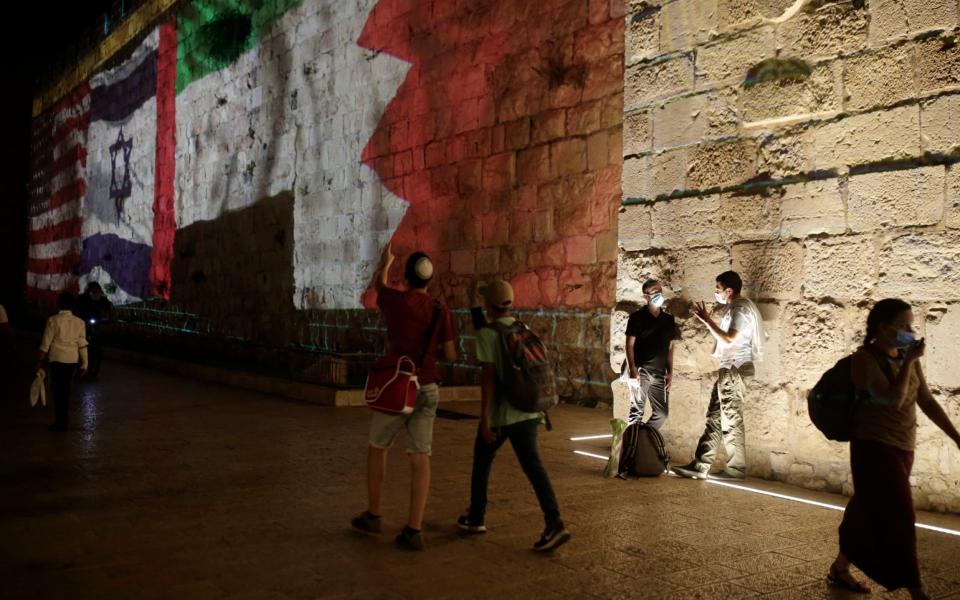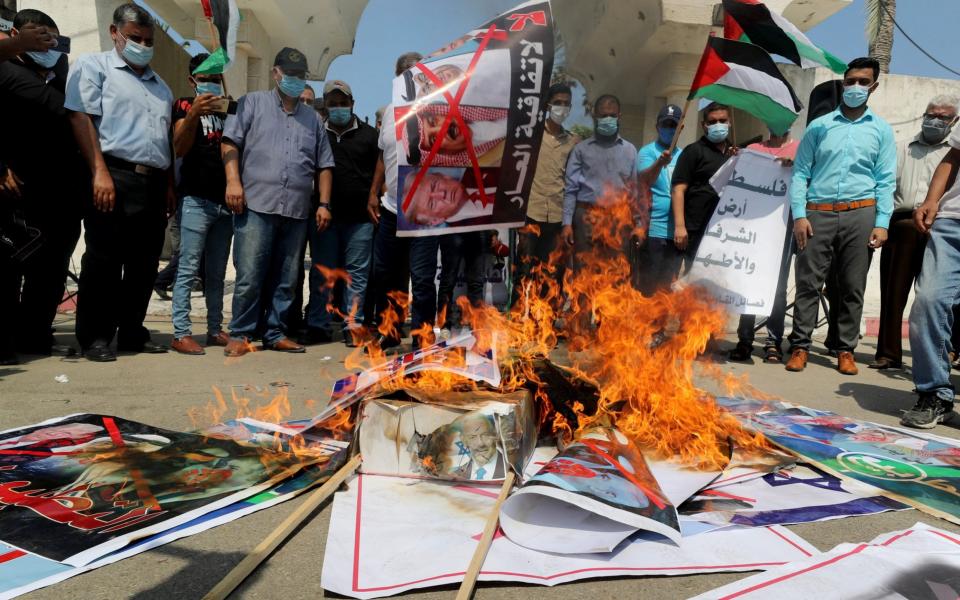Trump hails 'new dawn' in Middle East as Israel, UAE and Bahrain sign diplomatic deal at White House

Donald Trump presided over the signing of historic diplomatic deals between Israel, the United Arab Emirates and Bahrain, as he heralded a “new dawn” for the Middle East.
The US president on Tuesday hosted more than 700 guests on the White House’s South Lawn to witness the sealing of the agreements - dubbed the Abraham Accords after the patriarch of the world's three major monotheistic religions - using the occasion to burnish his credentials as a peacemaker.
"They are choosing a future in which Arabs and Israelis, Muslims, Jews and Christians can live together, pray together and dream together, in harmony," said the US president. “This is an incredible day for the world.”
Sheikh Abdullah bin Zayed bin Sultan al-Nahyan, the UAE's minister of foreign affairs, said: “We are witnessing today a new trend that will create a better path for the Middle East,” making sure in Arabic to reference a concession made by Benjamin Netanyahu, Israel's prime minister, to delay the annexation of occupied Palestinian territory in the West Bank.

The accord brings the Gulf countries toward normalising relations with Israel in a strategic realignment of Middle Eastern countries against Iran. The Trump administration has been pursuing a maximum pressure approach against Tehran, which it sees as the biggest threat in the region.
The deals, an improbable diplomatic victory for Mr Trump just weeks before the American election, make the UAE and Bahrain the third and fourth Arab states to take such steps since Israel signed peace treaties with Egypt in 1979 and Jordan in 1994.
While the latest deal is not a peace treaty in any formal sense as the three countries are not at war with one another, it opens up free trade, direct flights and diplomatic relations.
The UAE and Bahrain will now be able to purchase high-tech weapons from the US, as Israel already does, including Reaper drones, EA-18G Growler jets and F-35 fighter planes.
“You have boldly confronted the tyrants of Tehran,” said Mr Netanyahu, addressing Mr Trump. “You have brought hope to all the children of Abraham,” he added, before using the Hebrew and Arabic words for “peace”.
One noticeable absence was UAE Crown Prince Mohammed bin Zayed Al Nahyan, who has not visited the US since 2017 despite close ties with the administration.

Some observers speculated that MBZ, as he is often referred, did not want to be pressured by the Trump administration into ending the emirates’ blockade of neighbouring Qatar, another US ally.
Tony Blair, the former British prime minister and Middle East peace envoy who reportedly played a key role in the negotiations, was in attendance.
Mr Blair, who served as a Special Quartet Envoy to the Middle East from 2007 until 2015, had organised under-the-table meetings with Yitzhak Molcho, an ex-adviser to Mr Netanyahu in London, Abu Dhabi, and Nicosia, before the deal, he confirmed to Israel Hayoum, an Israeli news outlet.
Tony Blair was a rockstar at this event. People were lining up for photos with him.
Kevin McCarthy’s newly unveiled #CommitmentToAmerica also had a lot of people talking today.
👉🏻 https://t.co/tTQWCDIDjD pic.twitter.com/IQkhrCSq54— Frank Luntz (@FrankLuntz) September 15, 2020
There has been criticism of the agreement from Palestinians, who see the move as “a stab in the back” from their Arab allies.
Mohammad Shtayyeh, Palestinian prime minister, said that Tuesday would be a “black day” and “added to the calendar of Palestinian pain”.
Palestinian officials say the accord does not address the decades-long Israeli-Palestinian conflict - one of the world’s longest and most intractable conflicts.
Mr Netanyahu has insisted that Israel's plans to annex West Bank settlements is only suspended temporarily under the deal but remains on the table.

In a sign militant hardliners were not happy with the signing, rockets were reported to have landed in the southern Israeli cities of Ashkelon and Ashdod shortly after the event began.
“The agreement between Israel and Bahrain reflects a geopolitical alliance between repressive regimes that expands the US sphere of influence in the Middle East, rather than indicates a cessation of violence or an easing of oppression,” said Noura Erakat, an American-Palestinian human rights attorney.
She said the deals between the Arab countries and Israel, unlike others before it, did not secure any lasting concession for Palestinians.
Mr Trump, however, claimed on Tuesday that “we have many nations ready to follow, we’re very far down the road with five or six additional countries”. He said the Palestinains have also “seen what’s happening and want to get involved.”
Lolwah Alkhater, the assistant foreign minister for Qatar, which has warm relations with the Islamic Republic, yesterday said the country would not join Gulf neighbours until Israel’s conflict with the Palestinians was resolved.
Saudi Arabia has not officially commented on the likelihood.


